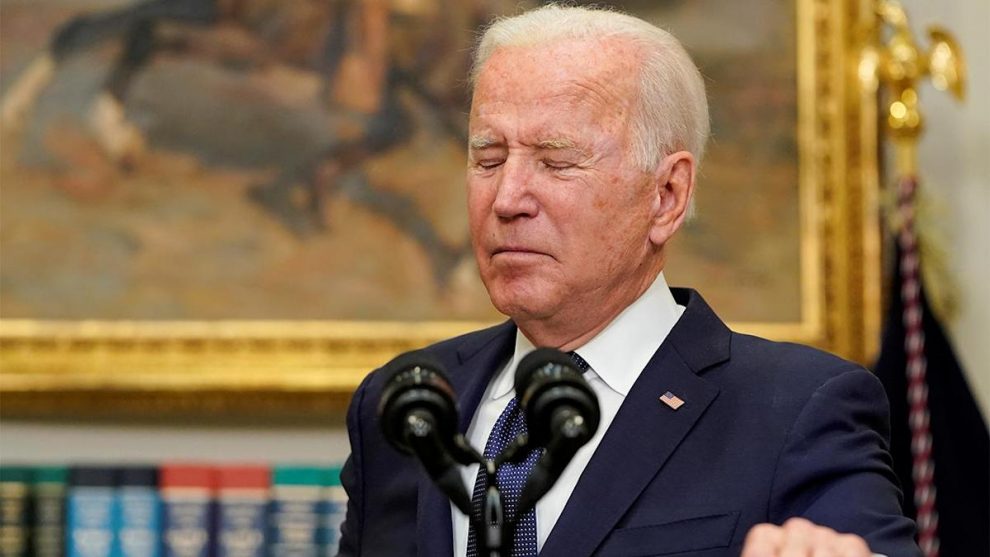Amid the tumultuous and chaotic withdrawal of U.S. forces and personnel from Afghanistan over the past couple of weeks, there’s no letup in the slide of President Biden’s approval ratings.
The president stands at 43% approval and 51% disapproval among Americans in a new NPR/PBS NewsHour/Marist national survey that was released on Thursday. Biden’s approval rating is down 6 points from July, and it’s the president’s lowest approval in Marist polling since taking office in January.
The new survey is the latest to indicate that the rocky exit from Afghanistan, ending a two-decade U.S. military presence in the war-torn Central Asian country, is taking a toll on the president’s political standing.
Biden’s approval rating had hovered in the low to mid 50s since succeeding former President Trump in the White House. But his numbers starting sliding last month, as the crisis in Afghanistan dominated media coverage.
The president now stands at 45%-49% approval/disapproval in an average of the last surveys compiled by RealClearPolitics, and at 46%-48% in a compilation by the polling and analysis website FiveThirtyEight.
The president has been facing a barrage of bipartisan criticism for some three weeks for his handling of the hastily organized evacuation efforts, where U.S. forces rushed to rescue as many Americans and allied civilians as quickly as possible following the lightning-fast takeover of Afghanistan by repressive Taliban forces.
While Biden has repeatedly declared the withdrawal and evacuation a success, he’s been accused by both Republicans and some Democrats for underestimating the Taliban and overestimating the strength of the now collapsed U.S. backed Afghan government and military.
Biden’s approval rating drop in the Marist poll was fueled by a 10-point plunge in support among independents and a five-point slip among Democrats over the past month.
According to the survey, 56% of Americans disapprove of the president’s handling of foreign policy and 61% give Biden a thumbs down on his handling of the Afghanistan withdrawal. But there was an expected partisan divide, with 94% of Republicans and three-quarters of independents – but just a quarter of Democrats – disapproving of Biden’s handling of Afghanistan.
More than seven in ten Americans – including supermajorities of Republicans, independents, and Democrats, say the U.S. role in Afghanistan was a failure. But more than six in ten say Afghanistan “must determine its future without U.S. involvement,” while 29% say the U.S. “has a duty” to stay involved.
“Although most Americans do not place the blame for the failed policy in Afghanistan on President Biden, many think he has mishandled the withdrawal of U.S. troops,” Marist Poll director Lee Miringoff highlighted. “The end of this chapter of American involvement in Afghanistan has taken a significant toll on Biden’s standing with Americans.”
Did Biden make the right call? Americans are split on what they think *should* have happened:
37% – withdrawn all troops
38% – withdrawn some, left some behind
But his approval rating has taken a big hit.
All the numbers are here: https://t.co/M8qB2RR8vs pic.twitter.com/nAoWrgohjn
— Marist Poll (@maristpoll) September 2, 2021
The poll indicates Americans are divided on how the U.S. should have proceeded, with 37% saying all troops should have been withdrawn and 38% saying some should have remained in Afghanistan. Only one in ten opposed the withdrawal of any U.S. forces, with 5% saying more should have been sent to the country.
Nearly three-quarters of Americans – 73% – approve of allowing Afghan refugees to settle in the U.S. But amid growing pushback from former President Trump and his allies on the right, there’s a partisan divide on this question. Eighty-six percent of Democrats and 78% of independents – but just 49% of Republicans – approve of allowing Afghan refugees to resettle in the U.S.
The NPR/PBS NewsHour/Marist Poll was conducted from August 26 – the day of the horrific terrorist attack at Kabul’s airport – through August 31. Live telephone operators questioned 1,241 adults nationwide. The survey’s overall sampling error is plus or minus 3.8 percentage points.
Story cited here.
























